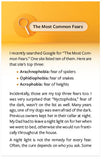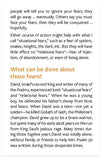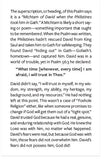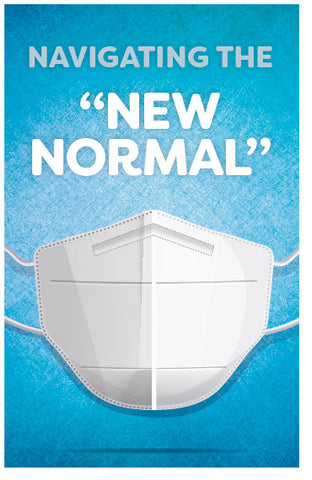The Remedy For Fear
Special-Order Folded Tract
 NOTE: This item is custom-printed to order (click for more details).
NOTE: This item is custom-printed to order (click for more details).
This tract is from our print-on-demand library, and is not kept in stock. Select the options below, and we will custom-print a batch just for you. Because this item is custom-printed, you can add your custom imprint to the back page at no extra cost.
- Estimated shipping date: Monday, September 22 (Click for more details)
- SKU:
- Discounts: Discount coupons do not apply to this item
- Format: Folded Tract
- Size: 3.5 inches x 5.5 inches
- Pages: 6
- Imprinting: Available with 5 lines of custom text
- Version: KJV
- Returns: Because this item is custom-printed to order, it cannot be returned.
Show all item details
The full text of this tract is shown below in the KJV version. (Do you want to print this tract in a different version than the one listed? Contact us and let us know what you're looking for—we may be able to create the alternate version for you at no charge.)
I recently searched Google for “The Most Common Fears.” One site listed ten of them. Here are that site’s top three:
Arachnophobia: fear of spiders
Ophidiophobia: fear of snakes
Acrophobia: fear of heights
Incidentally, those are my top three fears too. I was very surprised that “Nyctophobia,” fear of the dark, wasn’t on the list as well. Many years ago, one of my dogs was even afraid of the dark. Previous owners kept her in their cellar at night. My Dad had to leave a night light on for her when we went to bed, otherwise she would run frantically throughout the house.
A night light is not the remedy for every fear. Often, the cure depends on who you ask. Some people will tell you to ignore your fears; they will go away … eventually. Others say you must face your fears, then they will be conquered … hopefully.
Either course of action might help with what I call “situational fears,” such as a fear of spiders, snakes, heights, the dark, etc. But they will have little effect on “relational fears”—fear of rejection, of abandonment, or even of being alone.
What can be done about those fears?
David, Israel’s second King and writer of many of the Psalms, experienced both “situational fears” and “relational fears.” When he was a young boy, he defended his father’s sheep from lions and bears. When David was a teen—not yet a soldier—he killed Goliath of Gath, the Philistine’s champion. David grew up to be a brave warrior, but spent many of his early adult years on the run from King Saul’s jealous rage. Many times during those fugitive years David was totally alone, without family or friends to help him. Psalm 56 was written during those desperate times.
The superscription, or heading, of this Psalm says it is a “Michtam of David when the Philistines took him in Gath.” A Michtam is likely a short saying or poem—something important that ought to be remembered. When the Psalm was written, the Philistines hadn’t rescued David from King Saul and taken him to Gath for safekeeping. They found David “hiding out” in Gath—Goliath’s hometown—and captured him. David was in a world of trouble, yet in Psalm 56:3 he declared:
“What time [whenever, every time] I am afraid, I will trust in Thee.”
David didn’t say, “I will trust in myself, in my wisdom, my strength, my ability, my heritage, my background, and my resources.” He had nothing left at this point. This wasn’t a case of “Foxhole Religion” either, like when someone promises to change if God will get them out of a “tight spot.” David trusted God because he had a real, genuine, and enduring relationship with God. He knew the Lord was with him, no matter what happened. David’s fears were real, but because God was with him, those fears did not overwhelm him. David’s fears did not possess him; God did!
What about you?
Do you have a real, genuine, and enduring relationship with God like David? It is hard to trust someone you don’t know. You may be “religious,” but being religious is not the same as knowing God. Religion may tell you about God, but religion alone will never bring you into a right relationship with Him. The basis of every meaningful relationship is love, and there is no greater love than God’s love. John 3:16 says,
“For God so loved the world, that He gave His only begotten Son, that whosoever believeth in Him should not perish, but have everlasting life.”
God not only loves us—He loves us more than anyone else can. The Bible also says God loved us first, before we ever loved Him.
“Herein is love, not that we loved God, but that He loved us, and sent His Son to be the propitiation [the full and complete sacrifice] for our sins.” 1 John 4:10
God is the one reaching out in love. But many people refuse to trust Him because of past experiences. They have been hurt, rejected, or abandoned by those they trusted, so they expect God to do the same. But God doesn’t just love us. Rather, love is one of the highest expressions of who He is,
“… for God is love.” 1 John 4:8
Friend, bring your fears, your hurts, your disappointments—all your “baggage”—to God. Come as you are. Ask Him to save you, to cleanse you, to make you a new creature in Christ, and He will. That doesn’t mean your problems will magically disappear. Hard times will still come, but stormy days with God are far better than sunny days without Him.
Blessings to you!–Daniel Benton













